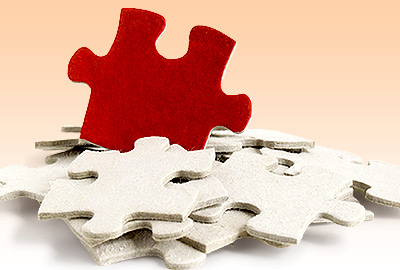Women often notice lapses in their memory as they approach menopause. Less identifiable than memory loss diseases such as dementia, where incidents of forgetfulness tend to be specific, menopausal “brain fog” refers to day-to-day difficulties with processing, storing, and retrieving new information. Perhaps you sometimes forget instructions immediately after hearing them, or you're struggling to recall a route you have driven once before. Memory lapses do not mean you are losing your mind, so do not panic: occasional brain fog is normal in menopausal women and - most importantly - it can be managed.
Understand the Symptom
The first step in dealing with memory lapses is to understand why they happen during menopause. The hormone estrogen plays a large part in the brain's ability to process, store, and retrieve new information, by influencing the performance of the hippocampus and a neurotransmitter called acetylcholine, which affect the brain's ability to retain and recall new information. During menopause, levels of estrogen in the body decline, which reduces estrogenic activity in the brain, causing memory lapses.
Talk with Your Loved-ones
Struggling to take in or recall information just given to you may cause friction with those close to you, whether this is your partner, children, or colleagues. Once you understand why memory lapses occur, you can explain the symptom to your loved-ones. Tell them you understand their frustration, but ask for their support as you work on your memory issues.
Take Notes
Jotting down instructions or important information given to you improves your chances of recalling it later and ensures you will not have to ask for the information to be repeated. Upon receiving information, repeating it aloud is another way of helping your brain to process it, and it increases your chance of recalling the information at a later date.
Stay Active
Studies have shown significant links between aerobic exercise and memory improvement. Cardiovascular activity, such as running, skipping, or swimming, for 30 minutes, five days a week will help sharpen your memory while boosting your fitness.
Engage
Engaging the brain in stimulating mental activities is a good way to boost memory. Think of memory as a muscle that can be strengthened; learning to play a musical instrument, doing crossword puzzles, playing word games with your partner, and reading are all great ways of keeping the brain active while having fun at the same time.
Get Interactive
Memory-training applications are a fun and effective way to sharpen your memory - provided they are medically approved. Ask your doctor for recommendations, or search for apps that have been Food and Drug Administration (FDA)-approved. The FDA is an organization which protects public health by assuring the safety and efficiency of health resources.
It's only natural to feel alarmed by menopausal memory lapses during menopause, and many women are quick to jump to drastic conclusions - that they are “senile” or showing signs of dementia - but, unless memory lapses are seriously impacting your life or your loved-ones have expressed concern, there is usually no need to consult a doctor. It is best to focus on tackling the symptom head-on to learn to manage it, remembering that memory lapses are a biological symptom and, while distressing, are no reflection on intelligence.
Sources
- Colcombe, S.J. (2006). Aerobic exercise training increases brain volume in aging humans. The journals of gerontology, 61(11), 1166-1170. Retrieved from http://www.ncbi.nlm.nih.gov/pubmed/17167157
- Food and Drug Administration. (2013). About FDA. Retrieved March 21, 2014, from http://www.fda.gov/aboutfda/whatwedo/
- Harvard Health Publications. (2014). Dealing with the symptoms of menopause. Retrieved March 21, 2014, from http://www.health.harvard.edu/newsweek/ Dealing_with_the_symptoms_of_menopause.htm
- National Institute on Aging. (2014) Cognitive training shows staying power. Retrieved March 21, 2014, from http://www.nia.nih.gov/newsroom/2014/01/ cognitive-training-shows-staying-power
- Office on Women's Health. (2010). Healthy Aging. Retrieved March 21, 2014, from http://womenshealth.gov/aging/mental-health/aging-brain.html
- University of Rochester Medical Center. (2012). "Brain Fog" of Menopause Confirmed. Retrieved March 21, 2014, from http://www.urmc.rochester.edu/news/story/index.cfm?id=3436
- Weber, M. & Mapstone, M. (2009) Memory complaints and memory performance in the menopausal transition. Menopause, 16(4), 694-700. doi: 10.1097/gme.0b013e318196a0c9
- Weber, M.T. et al. (2012). Reconciling subjective memory complaints with objective memory performance in the menopausal transition. Menopause, 19(7), 735-741. doi: 10.1097/gme.0b013e318241fd22




